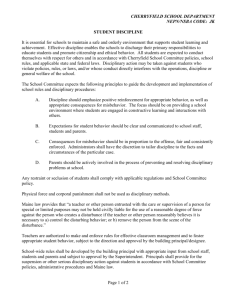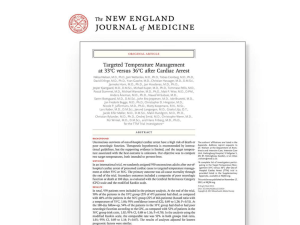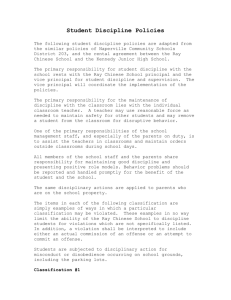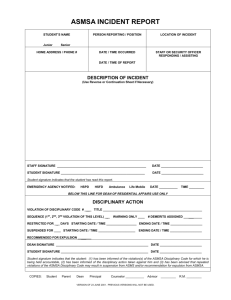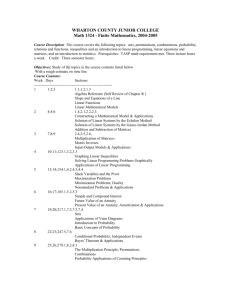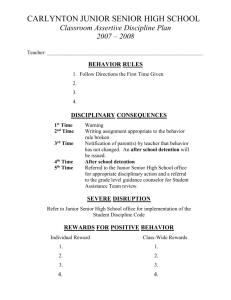policy - tmhra
advertisement
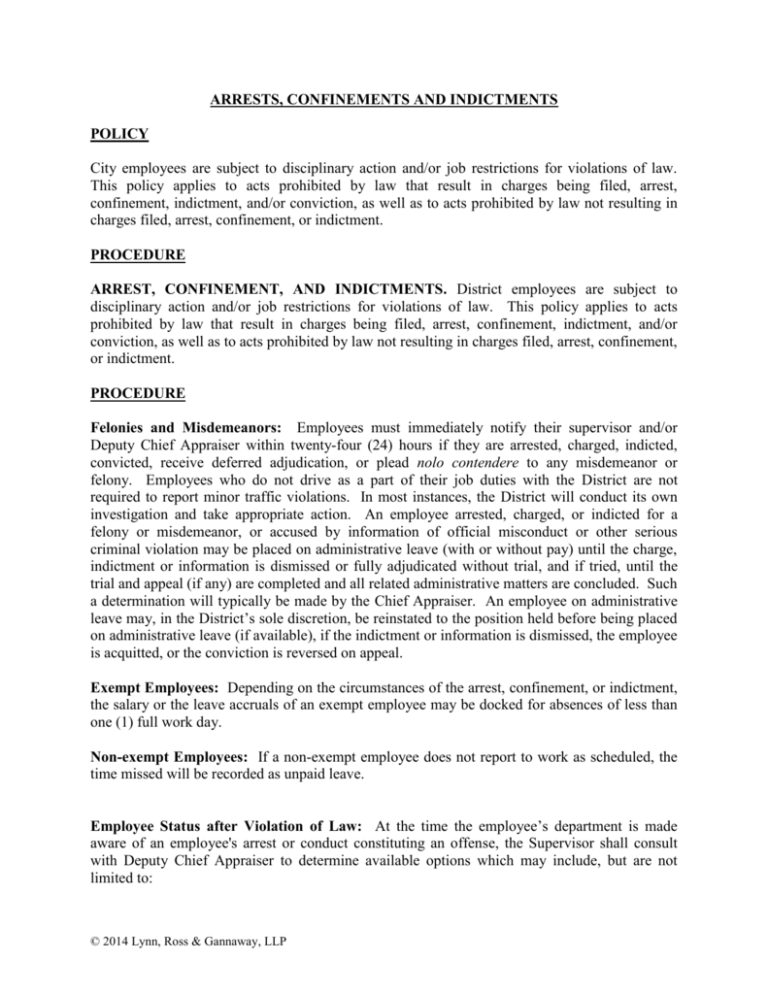
ARRESTS, CONFINEMENTS AND INDICTMENTS POLICY City employees are subject to disciplinary action and/or job restrictions for violations of law. This policy applies to acts prohibited by law that result in charges being filed, arrest, confinement, indictment, and/or conviction, as well as to acts prohibited by law not resulting in charges filed, arrest, confinement, or indictment. PROCEDURE ARREST, CONFINEMENT, AND INDICTMENTS. District employees are subject to disciplinary action and/or job restrictions for violations of law. This policy applies to acts prohibited by law that result in charges being filed, arrest, confinement, indictment, and/or conviction, as well as to acts prohibited by law not resulting in charges filed, arrest, confinement, or indictment. PROCEDURE Felonies and Misdemeanors: Employees must immediately notify their supervisor and/or Deputy Chief Appraiser within twenty-four (24) hours if they are arrested, charged, indicted, convicted, receive deferred adjudication, or plead nolo contendere to any misdemeanor or felony. Employees who do not drive as a part of their job duties with the District are not required to report minor traffic violations. In most instances, the District will conduct its own investigation and take appropriate action. An employee arrested, charged, or indicted for a felony or misdemeanor, or accused by information of official misconduct or other serious criminal violation may be placed on administrative leave (with or without pay) until the charge, indictment or information is dismissed or fully adjudicated without trial, and if tried, until the trial and appeal (if any) are completed and all related administrative matters are concluded. Such a determination will typically be made by the Chief Appraiser. An employee on administrative leave may, in the District’s sole discretion, be reinstated to the position held before being placed on administrative leave (if available), if the indictment or information is dismissed, the employee is acquitted, or the conviction is reversed on appeal. Exempt Employees: Depending on the circumstances of the arrest, confinement, or indictment, the salary or the leave accruals of an exempt employee may be docked for absences of less than one (1) full work day. Non-exempt Employees: If a non-exempt employee does not report to work as scheduled, the time missed will be recorded as unpaid leave. Employee Status after Violation of Law: At the time the employee’s department is made aware of an employee's arrest or conduct constituting an offense, the Supervisor shall consult with Deputy Chief Appraiser to determine available options which may include, but are not limited to: © 2014 Lynn, Ross & Gannaway, LLP allowing the employee to return to regular duty with pay; allowing the employee to return to restricted duty with pay; placing the employee on paid administrative leave; placing the employee on unpaid administrative leave; or terminating the employee. Disciplinary Action: Disciplinary action may be pursued concurrently or in place of the above options or imposed at a later date. Multiple violations of law or confinements within a prescribed time period may also result in disciplinary action. Violations of Law Discovered through Criminal History Check: The District may conduct criminal history checks on existing employees at any time during their employment, for any reason. Conduct constituting an offense, arrest or conviction that is discovered may result in disciplinary action, up to and including termination. Other Policies: This policy should not be construed to limit disciplinary action that may be taken in accordance with other Personnel Policies and Procedures, department policies, or other District-wide policies. Employee Detained by Law Enforcement Authorities: An employee that is questioned by law enforcement authorities and not free to leave is considered to be “detained.” A detained employee, who fails to report to work at the employee’s regularly scheduled time, and/or provide timely notification to the supervisor, will be subject to disciplinary action for unauthorized absence. Employees are to contact their immediate supervisor at the beginning of the next work shift after being detained by law enforcement authorities, including traffic stops, to report the detainment, arrest, confinement or indictment and reason. If the employee is unable to report to the supervisor because of confinement, the employee must have someone contact the supervisor for the employee, no later than the beginning of the next scheduled work shift, to report why the employee is unable to report to work. Exempt Employees: Depending on the circumstances of the arrest, confinement, or indictment, the salary or the leave accruals of an exempt employee may be docked for absences of less than one (1) full work day. Non-exempt Employees: If a non-exempt employee does not report to work as scheduled, the time missed will be recorded as unpaid leave. Felonies and Misdemeanors: Employees must immediately notify their supervisor and/or Department Director within twenty-four (24) hours if they are arrested, charged, indicted, convicted, receive deferred adjudication, or plead nolo contendere to any misdemeanor or felony. Employees who do not drive as a part of their job duties with the City are not required to report minor traffic violations. In most instances, the City will conduct its own investigation and take appropriate action. An employee arrested, charged, or indicted for a felony or misdemeanor, or accused by information of official misconduct or other serious criminal violation may be placed on administrative leave (with or without pay) until the charge, indictment or information is dismissed or fully adjudicated without trial, and if tried, until the © 2014 Lynn, Ross & Gannaway, LLP trial and appeal (if any) are completed and all related administrative matters are concluded. Such a determination will typically be made by the Department Director and the Director of Human Resources. An employee on administrative leave may, in the City’s sole discretion, be reinstated to the position held before being placed on administrative leave (if available), if the indictment or information is dismissed, the employee is acquitted, or the conviction is reversed on appeal. Employee Status after Violation of Law: At the time the employee’s department is made aware of an employee's arrest or conduct constituting an offense, the Department Director shall consult with Human Resources to determine available options which may include, but are not limited to: allowing the employee to return to regular duty with pay; allowing the employee to return to restricted duty with pay; placing the employee on paid administrative leave; placing the employee on unpaid administrative leave; or terminating the employee. Disciplinary Action: Disciplinary action may be pursued concurrently or in place of the above options or imposed at a later date. Multiple violations of law or confinements within a prescribed time period may also result in disciplinary action. Violations of Law Discovered through Criminal History Check: The City may conduct criminal history checks on existing employees at any time during their employment, for any reason. Conduct constituting an offense, arrest or conviction that is discovered may result in disciplinary action, up to and including termination. Other Policies: This policy should not be construed to limit disciplinary action that may be taken in accordance with other Personnel Policies and Procedures, department policies, or other city-wide policies. In addition to the policy above, civil service employees shall be governed by applicable departmental policies and procedures, the City’s Civil Service Rules and Regulations and Chapter 143 of the Texas Local Government Code. ARREST, CONFINEMENT, AND INDICTMENTS. District employees are subject to disciplinary action and/or job restrictions for violations of law. This policy applies to acts prohibited by law that result in charges being filed, arrest, confinement, indictment, and/or conviction, as well as to acts prohibited by law not resulting in charges filed, arrest, confinement, or indictment. © 2014 Lynn, Ross & Gannaway, LLP

